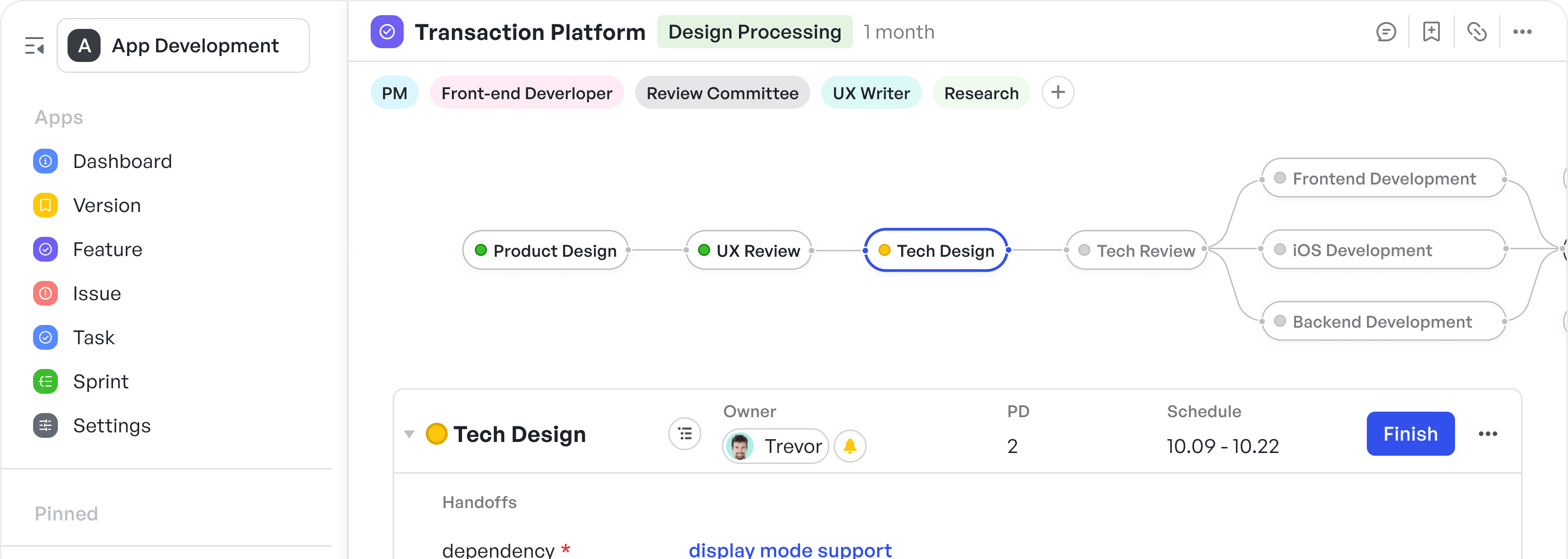Introduction
This guide aims to unpack the essentials of marketing project management, focusing on actionable strategies, the transformative power of specialized software, and the utility of adaptable templates. By integrating these elements, marketing teams can refine their project management approaches, optimize workflow, and achieve standout results in a competitive marketplace. Let's embark on this journey to uncover the pillars of successful marketing project management, designed to elevate your marketing projects from conception to fruition.
Key Strategies for Streamlined Marketing Project Management
Effective marketing project management is not just about what you do but how you do it. Navigating the complex currents of marketing initiatives requires a blend of well-chosen strategies, each tailored to enhance the planning, execution, and tracking of marketing projects. Below are key strategies that form the cornerstone of streamlined marketing project management:
Clear Planning and Objective Setting
Every successful marketing project starts with a blueprint. This plan outlines the project's goals, strategies, timeline, and budget. The most critical step in this planning phase is setting SMART (Specific, Measurable, Achievable, Relevant, Time-bound) objectives. These objectives ensure that everyone involved has a clear understanding of what success looks like and how it will be measured. For instance, rather than setting a vague goal of "increasing brand awareness," a SMART objective would specify "increasing website traffic by 30% within three months."
250px|700px|reset加载中,请稍后
250px|700px|reset
加载中,请稍后
Embracing Agile Methodology
Originating from software development, the Agile methodology has found fertile ground in marketing. Its principles of flexibility, continuous improvement, and delivering value in short cycles align perfectly with the dynamic nature of marketing projects. Implementing Agile practices allows marketing teams to adapt quickly to new information, test concepts, and refine strategies in real-time, ensuring that projects remain aligned with market needs and opportunities.
You may also be interested in this article!
Effective Communication Channels
In the whirlwind of creative ideas, tight deadlines, and multiple stakeholders, clear and continuous communication is paramount. Establishing effective communication channels, including regular project meetings, digital collaboration platforms, and progress reports, ensures that everyone stays informed, aligned, and engaged. These channels provide the infrastructure for open feedback, crucial for fostering a collaborative atmosphere and swiftly addressing any challenges or shifts in direction.
Leveraging Technology for Collaboration and Efficiency
With a plethora of project management and collaborative tools available, choosing the right technology stack can significantly enhance a team's productivity. Tools like Trello, Asana, or Slack facilitate task management, team communication, and document sharing, enabling marketing teams to stay organized and focused even in remote work environments.
Risk Management and Flexibility
Marketing projects often venture into uncharted territories, where risks and uncertainties lurk. Identifying potential risks early on—be it budget overruns, shifting market trends, or resource constraints - and devising contingency plans ensure projects stay on track. Additionally, maintaining a degree of flexibility allows the team to pivot strategies or adjust timelines as needed without derailing the entire project.
Continuous Learning and Improvement
In a landscape as fluid as marketing, what worked yesterday might not work today. Adopting a mindset of continuous learning and applying lessons learned from past projects can significantly improve future project outcomes. Post-project reviews and retrospectives are invaluable for identifying strengths, weaknesses, and areas for improvement.
Incorporating these strategies into your approach to marketing project management can help streamline processes, enhance team productivity, and ultimately, deliver projects that achieve, if not surpass, their intended marketing goals.
Advancing with Marketing Project Management Software
Choosing the right marketing project management software is pivotal for optimizing workflow and ensuring projects meet their deadlines and goals efficiently. Here are a few recommended tools, with key features, pros, and cons highlighted to help you make an informed decision:
Key Features:
- Task assignments and timelines
- Project dashboards for progress tracking
- Customizable to fit various workflows
- Integration with tools like Slack, Google Drive, and Salesforce
Pros:
- User-friendly interface
- Flexible task management and organization
- Strong collaboration features
Cons:
- The extensive range of features can be overwhelming for new users
- Limited functionality on the free version compared to paid plans
Key Features:
- Kanban boards for visual project management
- Easy to organize tasks with cards and lists
- Customizable with "Power-Ups" for additional features
- Integrates with apps like Google Drive, Slack, and Jira
Pros:
- Intuitive and easy to use
- Great for visual task tracking
- Flexible for a variety of projects and workflows
Cons:
- Can become cluttered with large projects
- More detailed project management features may require third-party integrations
Meegle is an innovative project management tool designed to cater to the diverse needs of various industries. It prioritizes flexibility, efficiency, and direct stakeholder engagement in the product development process.
Key Features:
- Highly customizable workflows: Allows for the creation of optimized workflows suited to specific project and team requirements.
- Seamless collaboration: Facilitates smooth communication and collaboration among team members.
- Flexible node settings: Users can set sub-workflows or sub-tasks under a certain node.
Pros:
- Versatility: Meegle's adaptability makes it suitable for a wide range of industries, not just gaming.
- Enhanced Productivity: Its various tools and features are designed to streamline the project management process, increasing overall team productivity.
Cons:
- Learning Curve: Given its wide array of features and customizable options, new users might experience a steep learning curve.
- Overwhelming for Smaller Projects: Smaller teams or projects might find the extensive features more than they need, potentially complicating rather than simplifying their process.
Core Value:
Meegle’s core value lies in its flexibility and the empowerment of teams to create the most optimal workflows. This approach to project management goes beyond industry boundaries, enabling seamless management of the product development process, enhancing direct engagement with stakeholders, and ensuring that Meegle can be effectively applied to any sector that requires detailed and efficient project management.
Key Features:
- Customizable workflows and templates
- Time tracking and workload management
- Automated notifications and reminders
- Integration with tools such as Slack, Google Drive, and Dropbox
Pros:
- Highly customizable to fit various project needs
- Visual and intuitive interface
- Robust collaboration and communication tools
Cons:
- Can be expensive for small teams or startups
- Might require a learning curve to fully utilize all features
Key Features:
- Task and subtask management
- Goal tracking and time management
- Custom views for tasks and projects
- Integration with over 1000 tools like Slack, GitHub, and Zoom
Pros:
- Highly versatile and feature-rich
- Offers a generous free plan
- Good for teams of all sizes
Cons:
- The sheer breadth of features can be daunting for beginners
- Some users report occasional bugs and glitches
When selecting marketing project management software, it's crucial to consider factors such as team size, the complexity of projects, and specific needs like collaboration and integration capabilities. Test-driving a few options through free trials can provide valuable hands-on experience to inform your choice.
Enhancing Efficiency with Marketing Project Management Templates
To get started, here are a few essential templates every marketing team should have in their toolkit:
- Project Brief Template
- Project Brief Template
Before diving into the details, a project brief template helps clarify the project's objectives, target audience, budget, timeline, and key deliverables. It serves as a reference point for the entire team throughout the project’s lifecycle.
250px|700px|reset
加载中,请稍后
- Content Calendar Template
- Content Calendar Template
A content calendar helps organize publication schedules across different platforms, ensuring a consistent flow of content. It often includes details such as the content topic, the responsible team member, and the publication date.
250px|700px|reset
加载中,请稍后
250px|700px|reset
加载中,请稍后
- Budget Tracker Template
- Budget Tracker Template
Keeping a close eye on finances is crucial for any project. A budget tracker template helps in monitoring expenditures against the allocated budget, enabling teams to make adjustments before overspending occurs.
250px|700px|reset
加载中,请稍后
- Campaign Analytics Report Template
- Campaign Analytics Report Template
Post-campaign, it's essential to evaluate performance. An analytics report template can guide teams in capturing key metrics, analyzing results, and drawing insights for future initiatives.
250px|700px|reset
加载中,请稍后
These templates, among others, equip marketing project managers with the tools needed to streamline workflows, enhance efficiency, and foster a collaborative environment. By adopting and customizing these templates to fit their specific project needs, marketing teams can significantly reduce administrative overhead, allowing more time and energy to be focused on creative and strategic endeavors.
FAQs
- What skills are necessary for effective Marketing Project Management?
- What skills are necessary for effective Marketing Project Management?
- Essential skills include organization, communication, time management, strategic thinking, problem-solving, and a good understanding of marketing strategies and tools.
- How does one become a Marketing Project Manager?
- How does one become a Marketing Project Manager?
- Typically, it involves gaining experience in marketing or project management roles, coupled with relevant education in marketing, business, or a related field. Certifications in project management can also be beneficial.
- How does Marketing Project Management contribute to a company's bottom line?
- How does Marketing Project Management contribute to a company's bottom line?
- By ensuring marketing projects are executed efficiently and effectively, Marketing Project Management contributes to optimizing resources, maximizing ROI (Return on Investment) from marketing campaigns, and ultimately, driving sales and revenue growth.
- What metrics are important to track in Marketing Project Management?
- What metrics are important to track in Marketing Project Management?
- Key metrics include project completion rate, time to market, budget adherence, ROI of marketing campaigns, conversion rates, and customer engagement metrics.
- Can small businesses benefit from Marketing Project Management?
- Can small businesses benefit from Marketing Project Management?
- Absolutely. Small businesses, in particular, can see significant benefits from streamlined project management practices, as they often work with limited resources and tight budgets. Effective management ensures that marketing efforts are strategic and well-coordinated, maximizing impact.





